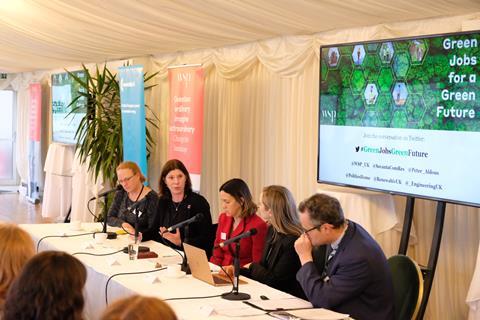Experts call for campaign to raise awareness of opportunities in green transition sectors
Nearly two-fifths of students would not consider a career in construction, according to research commissioned by engineering giant WSP.
The survey of 3,917 people between 16 and 23 years old, carried out online by Savanta ComRes earlier this month, aimed to gauge the youngsters’ attitudes to green skills and job opportunities across the economy.

Asked which sectors they would not consider a career in, construction was the second most chosen after metals and mining, with 37% saying they would avoid the industry.
The research revealed a high level of concern about climate change – 87% said they were very or somewhat concerned – but pessimism about how they could affect it and a lack of understanding of what constituted a green job.
Only half of respondents felt their generation could have a high impact on tackling climate change and just two in five said they understood what the term green jobs means.
The dataset, which was largely composed of university students and contained a roughly even mix of STEM & non-STEM students, was twice the size typically used by political opinion polls.
The findings were presented yesterday morning at an event hosted by the engineering firm in the House of Commons, with a panel discussion sponsored by Peter Aldous MP, chair of the further education and lifelong learning all-party parliamentary group.
There was broad agreement across the panel, which also included representatives from WSP, RenewableUK and EngineeringUK, that industry needed to do a better job of promoting green careers.
Just one-in-five students said they felt informed about the range of green jobs that are available to them.
Jane Cooper, offshore wind director at RenewableUK, said the ComRes survey showed the industry had missed out on a cohort of talent and suggested a government- or industry-led effort “a bit like the armed forces campaign on the telly” to increase awareness of the variety of roles necessary for the green transition.
Noting the strength of feeling among young people regarding climate change, she said: “If this is not the point we get young people into STEM, we have really failed.”
But the panel also said that sustainability and engineering needed to be promoted in the early stages of education too, reflecting the survey’s finding that more than three in four of the university polled would have liked to learn more about the climate in school.
>> Why everyone’s getting excited about the new energy efficiency taskforce
Aldous said this could not be achieved merely by adding topics to the existing curriculum. “What I am talking about is a root and branch reform to ingrain sustainability into the curriculum,” he said.
Dr Isabel DiVanna, director of business development and partnerships at EngineeringUK, said the sector needed to “do more to showcase green jobs to young people” and raise awareness that many roles required for the green transition do not require a university education.
WSP executive director Rachel Skinner added the firm’s research showed an “uphill struggle” to develop the right skills and expertise.
Every Person Counts

We know the industry has no shortage of suggestions for tackling construction’s skills crisis, from reforming apprenticeships, to offering more flexibility, to increasing diversity, to providing better pathways from education to the workplace.
Our Every Person Counts coverage aims to provide a place where debates can play out, views be aired and solutions shared on all these topics.
If you have an employment initiative you want to tell us about email us at newsdesk@building.co.uk with the subject line “Every Person Counts”. You can also contact us via Twitter @BuildingNews and LinkedIn @BuildingMagazine, please use the hashtag #everypersoncounts. We look forward to hearing your employment stories.
You can find all our Every Person Counts coverage in one place on our website.
“While today’s students have grasped the crucial importance of the engineering and infrastructure sectors in securing a lower carbon future, many of them do not view these sectors as prime targets for their own future employment,” she said.
She added that the industry “can’t carry on doing things the way we always have” and needed to act quickly to address the problem.
“Everything we do right now will be cheaper and less risky than if we leave it until later […] the exportability of these skills goes up if we act sooner,” she said. “We know what direction we need to go so let’s just get on with it.”




























No comments yet